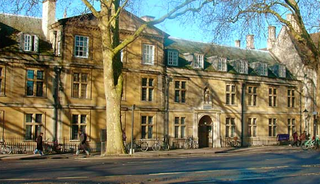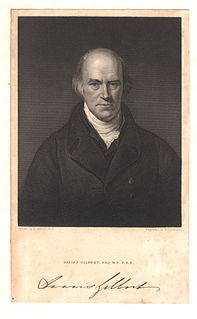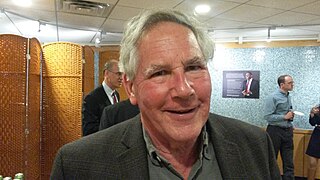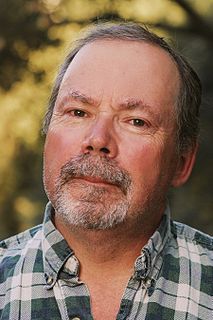Related Research Articles

Sir Charles Antony Richard Hoare is a British computer scientist. He developed the sorting algorithm quicksort in 1959–1960. He also developed Hoare logic for verifying program correctness, and the formal language communicating sequential processes (CSP) to specify the interactions of concurrent processes and the inspiration for the programming language occam.

Blackfriars, Oxford is a Permanent Private Hall of the University of Oxford. Blackfriars houses three distinct institutions: the Priory of the Holy Spirit, the religious house of the friars, whose current prior is Robert Gay; Blackfriars Studium, the centre of theological studies of the English Province of the Dominican Friars ; and Blackfriars Hall, one of the constituent educational institutions of the University of Oxford. The current acting Regent of both the hall and studium is David Goodill. The name Blackfriars is commonly used to denote a house of the Dominican Friars in England, a reference to the black-colored "cappa", which is part of their habit.

Kellogg College is a graduate-only constituent college of the University of Oxford in England. Founded in 1990 as Rewley House, Kellogg is the university's 36th college and the largest by number of students. It hosts research centres including the Institute of Population Ageing and the Centre for Creative Writing, and is closely identified with Lifelong learning at Oxford.
Peter Pin-Shan Chen is a Taiwanese American computer scientist. He is a distinguished career scientist and faculty member at Carnegie Mellon University, who is known for the development of the entity-relationship model in 1976.

The Oxford Internet Institute (OII) is a multi-disciplinary department of social and computer science dedicated to the study of information, communication, and technology, and is part of the Social Sciences Division of the University of Oxford, England. It is housed over three sites on St Giles in Oxford, including a primary site at 1 St Giles, owned by Balliol College. The department undertakes research and teaching devoted to understanding life online, with the aim of shaping Internet research, policy, and practice.

Davies Gilbert was a Cornish engineer, author, and politician. He was elected to the Royal Society on 17 November 1791 and served as President of the Royal Society from 1827 to 1830. He changed his name to Gilbert in 1817.
Thomas H. Cormen is the co-author of Introduction to Algorithms, along with Charles Leiserson, Ron Rivest, and Cliff Stein. In 2013, he published a new book titled Algorithms Unlocked. He is a professor of computer science at Dartmouth College and former Chairman of the Dartmouth College Department of Computer Science. Between 2004 and 2008 he directed the Dartmouth College Writing Program. His research interests are algorithm engineering, parallel computing, speeding up computations with high latency.
David Nathaniel Spergel, is an American theoretical astrophysicist. He is the Director of the Center for Computational Astrophysics at the Flatiron Institute and the Charles A. Young Professor of Astronomy on the Class of 1897 Foundation, Emeritus, at Princeton University. Spergel is known for his work on the WMAP mission. Spergel is a MacArthur Fellow. He is a member of the NASA Advisory Council and is chair of the Space Studies Board. He was once the W.M. Keck distinguished visiting professor at the Institute for Advanced Study in Princeton, New Jersey. He was part of the team that originated the WMAP mission and designed the spacecraft, and has worked on deciphering the data that it beams back from space. Spergel is playing a leading role in developing the Nancy Grace Roman Space Telescope, a multibillion-dollar space mission planned for launch in the mid-2020s. He shared the 2010 Shaw Prize in astronomy with Charles L. Bennett and Lyman Alexander Page, Jr. for their work on WMAP. He shared the 2015 Dannie Heineman Prize with Marc Kamionkowski "for their outstanding contributions to the investigation of the fluctuations of the cosmic microwave background that have led to major breakthroughs in our understanding of the universe".

Sir Bernard Walter Silverman, is a British statistician and Anglican clergyman. He was Master of St Peter's College, Oxford from 1 October 2003 to 31 December 2009. He is a member of the Statistics Department at Oxford University, and is also attached to the Wellcome Trust Centre for Human Genetics, the Smith School of Enterprise and the Environment, and the Oxford-Man Institute of Quantitative Finance. He has been a member of the Council of Oxford University and of the Council of the Royal Society. He was briefly President of the Royal Statistical Society in January 2010, a position from which he stood down upon announcement of his appointment as Chief Scientific Advisor to the Home Office. He was awarded a Knighthood in the 2018 New Years Honours List, "For public service and services to Science".

Christopher John Lintott is a British astrophysicist, author and broadcaster. He is a Professor of Astrophysics in the Department of Physics at the University of Oxford. Lintott is involved in a number of popular science projects aimed at bringing astronomy to a wider audience and is also the primary presenter of the BBC television series The Sky at Night, having previously been co-presenter with Patrick Moore until Moore's death in 2012. He co-authored Bang! – The Complete History of the Universe with Moore and Queen guitarist and astrophysicist Brian May.
Gary King is an American political scientist and quantitative methodologist. He is the Albert J. Weatherhead III University Professor and Director for the Institute for Quantitative Social Science at Harvard University. King and his research group develop and apply empirical methods in many areas of social science research, focusing on innovations that span the range from statistical theory to practical application.

Donald Thomas Critchlow is the Katzin Family Foundation Professor at Arizona State University specializing in American political history. He serves currently as director for the program for Political History and Leadership and a professor of history at Arizona State University. He has appeared on C-Span, National Public Radio, BBC World News, and many talk radio programs. He has written for the Washington Post, New York Observer, New York Post, and National Review. He is the author and editor of 25 books and is the founding editor of Journal of Policy History published by Cambridge University Press.

Amiya Chandra Chakravarty (1901–1986) was an Indian literary critic, academic, and Bengali poet. He was a close associate of Rabindranath Tagore, and edited several books of his poetry. He was also an associate of Gandhi, and an expert on the American catholic writer and monk, Thomas Merton. Chakravarty was honoured for his own poetry with the Sahitya Akademi Award in 1963. He taught literature and comparative religion in India for nearly a decade and then for more than two decades at universities in England and the U.S. In 1970, he was honoured by the Government of India with the Padma Bhushan award.
Michael J. Franklin is an American software entrepreneur and computer scientist specializing in distributed and streaming database technology. He is Liew Family Chair of Computer Science and Chairman for the Department of Computer Science at the University of Chicago.

Gilean Alistair Tristram McVean is a professor of statistical genetics at the University of Oxford, director of the Big Data Institute, fellow of Linacre College, Oxford and co-founder and director of Genomics plc. He also co-chaired the 1000 Genomes Project analysis group.

Norman Daniels is an American political philosopher and philosopher of science, political theorist, ethicist, and bioethicist at Harvard University and the Harvard T.H. Chan School of Public Health. Before his career at Harvard, Daniels had built his career as a medical ethicist at Tufts University in Medford, Massachusetts, and at Tufts University School of Medicine, also in Boston.

Philip Eric Bourne is an Australian bioinformatician, non-fiction writer, and businessman. He is currently Stephenson Chair of Data Science and Director of the School of Data Science and Professor of Biomedical Engineering and was the first Associate Director for Data Science at the National Institutes of Health, where his projects include managing the Big Data to Knowledge initiative, and formerly Associate Vice Chancellor at UCSD. He has contributed to textbooks and is a strong supporter of open-access literature and software. His diverse interests have spanned structural biology, medical informatics, information technology, structural bioinformatics, scholarly communication and pharmaceutical sciences. His papers are highly cited, and he has an h-index above 50.
Philip N. Howard is a sociologist and communication researcher who studies the impact of information technologies on democracy and social inequality. He studies how new information technologies are used in both civic engagement and social control in countries around the world. He is Professor of Internet Studies at the Oxford Internet Institute and Balliol College at the University of Oxford. He is the author of eight books, including New Media Campaigns and The Managed Citizen, The Digital Origins of Dictatorship and Democracy, and Pax Technica: How the Internet of Things May Set Us Free or Lock Us Up.
Simon Tavaré is the founding Director of the Herbert and Florence Irving Institute of Cancer Dynamics at Columbia University. Prior to joining Columbia, he was Director of the Cancer Research UK Cambridge Institute, Professor of Cancer Research at the Department of Oncology and Professor in the Department of Applied Mathematics and Theoretical Physics (DAMTP) at the University of Cambridge.
Thomas M. Nichols is an academic specialist on international affairs, currently a professor at the U.S. Naval War College and at the Harvard Extension School. His work deals with issues involving Russia, nuclear weapons, and national security affairs. He was previously a fellow at the Center for Strategic and International Studies, the Carnegie Council for Ethics in International Affairs, and the John F. Kennedy School of Government at Harvard University.
References
- ↑ "Thomas Nichols". Oxford Big Data Institute. Retrieved 2020-03-12.
- ↑ "Thomas E. Nichols Curriculum Vitae" (PDF). Retrieved 2020-07-08.